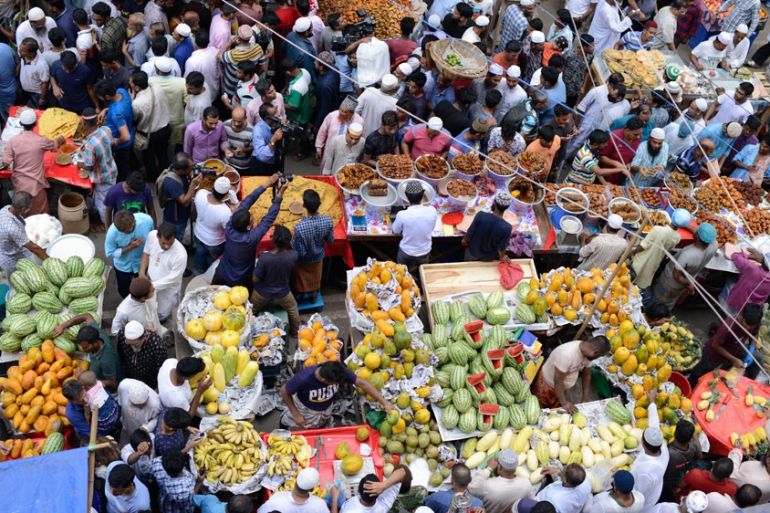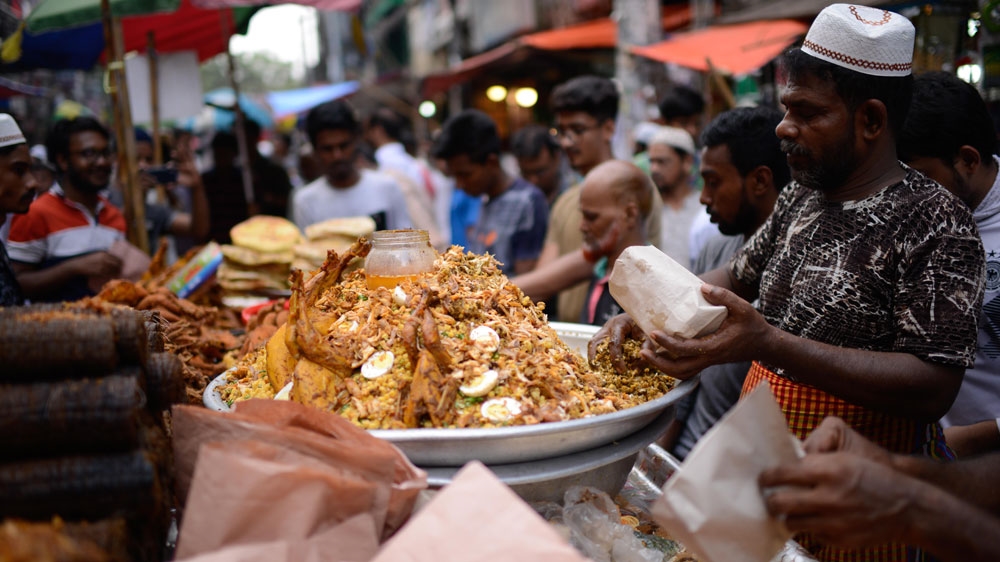Fears of another inferno at Bangladesh’s busy Iftar Bazar
Months after deadly Chawk Bazar blaze, worries of another fire loom over Dhaka’s oldest and largest Ramadan market.

Dhaka, Bangladesh – Iftar, the first meal for Muslims after breaking fast, always meant the presence of “shahi jilapi”, a rosewater-soaked delicacy on the dining table in Nasir Uddin’s home.
But the person who used to bring this orange-coloured sweet during the Muslim holy month of Ramadan is no more.
Keep reading
list of 4 itemsThe surfer chef behind South Africa’s first fine dining halal restaurant
Why are Pakistan’s wheat farmers protesting against the government?
About 282 million people faced acute hunger last year: UN-led report
“My son Wasi, a big fan of those sweets, was burned to death this February,” Nasir Uddin told Al Jazeera.
Wasi, 23, was one of the victims of a deadly fire that broke out on February 21 in Chawk Bazar, a bustling corner in Bangladesh‘s capital known as Old Dhaka.
Caused by flammable chemicals stored inside a residential building, the massive fire raced through several apartment buildings in the neighbourhood and killed 71 people.
Uddin, a Chawk Bazar resident for five decades, also lost his daughter to cancer in 2011. But the ongoing Ramadan has made his son’s absence more acute.
“Ramadan reminds me of him a lot. He loved the foods during the month and used to bring all those delicacies from the nearby iftar market,” he said.

Barely 250 metres from the site of the devastating Chawk Bazar fire sits the Iftar Bazar, the oldest and largest iftar market in the Muslim-majority South Asian nation.
The teeming makeshift site around the historic Bagha Shahi Mosque attracts hundreds of thousands of people during Ramadan.
“It’s hard to not get overwhelmed by the food offerings at the iftar market. Even though my son is no more, I sometimes go there to bring home ‘shahi jilapi’ or ‘shahi halim’,” Uddin said. “It’s part of what we call our Old Dhaka tradition.”
The Old Dhaka area charms with its narrow lanes, Mughal and colonial-era buildings, as well as its century-old culinary secrets and gastronomic delights.
Established on the banks of Buriganga River during the Mughal rule some 400 years ago, Chawk Bazar became Dhaka’s main business hub – and soon its food capital.
Inspired by Mughal and regional delicacies, its main attractions include “hajir biriyani” (rice mixed with chopped mutton), “nannar shahi morog polau” (fragrant rice with chicken), “bismillah kebab” (grilled minced meat) and “shomsher alir khichuri” (mix of rice, lentil and mutton legs).
“Many of these restaurants have their own unique recipes and cooking styles and the proprietors keep those as closely guarded secret,” Rashed Jitu, a 34-year-old Chawk Bazar resident, told Al Jazeera.
During Ramadan, these restaurants sell their culinary delights at the Chawk Bazar iftar market.
“We are immensely proud of this iftar market. People from all parts of the city throng here to get a taste of Old Dhaka delicacies. Newspapers and TV channels do their Ramadan stories from here,” said Jitu.
He said eating out or bringing food from nearby restaurants is a common practice in Old Dhaka households. “It’s not like we eat biryani, pilau or other fancy Mughal dishes every day, but we surely try to have them as much as we can.”

Tinder box
When asked if the February fire in this neighbourhood affected the iftar market, Jitu replied, “Of course, the memory of fire is still fresh, but iftar bazaar has been like this for over 100 years. I don’t think there is much impact on the market because of the fire.”
The area in Chawk Bazar where the blaze took place is no different from the way the makeshift iftar market organises itself. In both neighbourhoods, multistorey buildings stand side-by-side, with narrow lanes between them bursting at their seams with people.
The area around the Chawk Bazar Shahi Mosque is a wholesale hub, with shops storing and selling perfume, plastic products and even chemicals, despite a ban on the storage of chemical goods in residential buildings.
Moreover, hundreds of makeshift ovens are dotted in the area, which is visited by thousands of people including children, making another fire disaster a possibility.
“The whole Chawk Bazar is under immense fire risk,” said Shakil Newaz, director of operations at Bangladesh’s Fire Service and Civil Defence. “There are no fire safety measures in markets or restaurants there.”
Newaz said residents in Old Dhaka are accustomed to living in close quarters. “Tragic fires like Nimtoli and Chawk Bazar happened here but they barely changed their lifestyle,” he said.

During a peak-hour visit to the iftar market on a Friday afternoon, Al Jazeera found that both sellers and buyers, and even the onlookers, were dismissive of a possible fire hazard.
Mohammad Hossain, 55, was busy preparing his famous “boro baper polai khai” – puffed rice mixed with different kebabs, roasted meat and egg.
“For 25 years, I have been making this dish. It is a big hit in this market,” said Hossain as he mashed his goodies into a pile and filled paper packets. “Yes, a fire happened months ago, but we need to earn our livings, right?”
Abdul Barek, 41, has been selling iftar items in Chawk Bazar for more than two decades. “We have been living like this for years. It’s hard to change lifestyle all of a sudden,” he said.
“Besides, the Old Dhaka food always helps in forgetting the bad memories.”
Additional reporting by Mubtasim Fuad